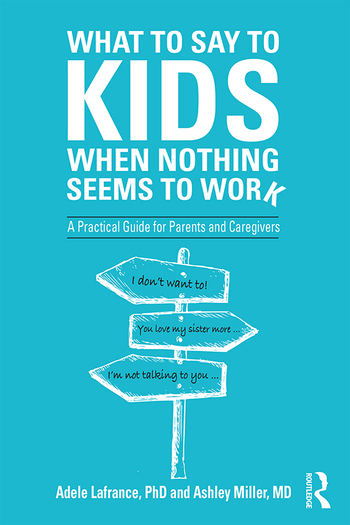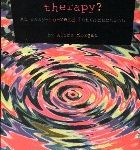*Finalist for Best Overall Non-Fiction and Best Parenting & Family Book in the 2020 International Book Awards!*
What to Say to Kids When Nothing Seems to Work offers parents an effective, step-by-step guide to some of the most common struggles for kids aged 5–12. Written by mental health professionals with over 30 years’ experience listening to kids’ thoughts and feelings, this book provides a framework to explore new ways of responding to your child that will help them calm down faster and boost their resilience to stress.
With a dose of humor and plenty of real-life examples, the authors will guide you to “build a bridge” into your child’s world to make sense of their emotions and behavior. Sample scenarios and scripts are provided for you to customize based on your caregiving style and your child’s personality. These are then followed by concrete support strategies to help you manage current and future situations in a way that leaves everyone feeling better. Chapters are organized by common kid-related issues so you can quickly find what’s relevant to you.
Suitable for parents, grandparents, and other caregivers of children and pre-teens, as well as professionals working closely with families, What to Say to Kids When Nothing Seems to Work is an accessible resource for efficiently navigating the twists, turns, and sometimes total chaos of life with kids.
Contents:
- Part I.
- 1. A New Path
- 2. The Road Map
- 3. Potential Roadblocks
- 4. Staying on Track
- Part II.
- 5. “I don’t want to…”
- 6. “I miss…”
- 7. “You love my sister more…”
- 8. “This is the BEST!”
- 9. “My tummy hurts…”
- 10. “I’m not talking to you…”
- 11. “I’m so bad/stupid…”
- 12. “You just don’t get it!”
- 13. “I can’t decide…”
- 14. “Don’t go to work!”
- 15. “I got a terrible mark…”
- 16: “I hate my life!”
- 17. POW! (Dealing with aggression)
- 18. “Don’t make me go to Mom’s/Dad’s!”
- 19, The “Do-Over”
- 20. “You’re too soft! & You’re too hard!”
- 21. “Why are you talking to me like that?”
- Part III.
- 22. New Directions
- 23. Practical Resources
- 24. Recommended Readings
Author Bio:
Adele Lafrance, PhD, is a clinical psychologist, research scientist, and co-developer of Emotion-Focused Family Therapy. She offers workshops for the general public and mental health agencies worldwide.
Ashley Miller, MD, is a child psychiatrist at BC Children’s Hospital and a clinical assistant professor of psychiatry at the University of British Columbia where she is co-director of family therapy training for psychiatry residents.
Review:
“One might wonder how Ashley Miller and Adele Lafrance could possibly tell us ‘what to say when nothing seems to work’, since we can think of countless situations when we parents have that experience. They would certainly fail if they focused on each specific behavior and possible associated reasons for it and consequences to give. Instead, these authors focus on where we get stuck (our ‘knee jerk reactions’ and ‘common pitfalls’) as well as what we tend to overlook (our child’s mind along with our own) and present a way forward—a script that reaches into all manner of situations that are proving to be extra challenging. They show us how to build a bridge to the child’s mind, develop possible emotional translations for what we discover in our child, and put our discoveries into practical words that lead our child to feeling understood and being more willing to join us in a way that works for us both. Miller and Lafrance suggest possible scripts for a great many situations, while encouraging us parents to adapt them for our unique child and family. As a bonus, they offer scripts that might be of value in bridge-building with our partner too. After all, all family relationships are likely to become tricky and messy. This is a good book to take with us on our journey as we try to ‘get it right’ as well as to engage in the ‘do-overs’ that will certainly be necessary. This is a note of gratitude to these authors for their clearly written and oh-so-practical book for parents everywhere.” – Dan Hughes, Ph.D., founder of Dyadic Developmental Psychotherapy (DDP) and author of many books including Attachment Focused Parenting: Building the Bonds of Attachment (3rd Ed.)






